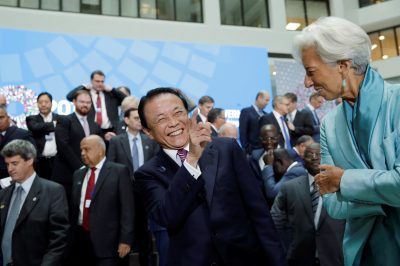G20 GDP will be 3 per cent smaller in 2018 instead of being 2 per cent larger. So which countries aren’t pulling their weight?
To have done its fair share, each country needs to have grown its GDP by at least 2 per cent since October 2013 (the baseline for the commitment). To cut to the chase, Asia is not doing the heavy lifting, contrary to popular opinion. The region tends instead to be fairly mixed in terms of its performance.
The worst offenders in the G20 are Brazil and Russia, falling short of their fair shares by 22 per cent and 20 per cent respectively. Of course, it’s hard for the G20 to get too upset with Russia since it is the sanctions from other G20 countries that are causing its low growth. Brazil, facing a deep economic recession, probably has bigger things on its mind than G20 commitments.
The next worst offenders have fewer excuses: South Africa (falling short by 11 per cent), Saudi Arabia (10 per cent), Argentina (9 per cent) and Mexico (7 per cent). Even the major economies are struggling: the US fell short by 5 per cent, China by 4 per cent and Japan by 6 per cent. Australia is also on the wrong side of the ledger, but not by much. Australia delivered 3 per cent short on the target. Italy, Canada and France are not far off and Indonesia and South Korea are in the middle of the pack.
Looking to the other end of the spectrum, which countries are doing the best? Although not synonymous with growth in recent years, Spain has done much better than expected. Spain contributed 6 per cent more than its fair share, closely followed by India at 4 per cent. The UK and Germany came close, falling short by only 0.8 and 1 per cent, respectively.
Global growth has weakened since the 2 per cent growth commitment was made, meaning the G20 would probably have struggled to meet its target even if it had delivered all the reforms it had promised. But analysis from the IMF and OECD gives the other part of the answer.
As of 2016, G20 countries have implemented only half of the reforms they said they would. The IMF and OECD say the rest of these commitments are a ‘work in progress’ but this is probably a bit generous. For example, Australia’s 2014 commitments included university deregulation, the general practitioner co-payment and a gold-plated paid parental leave scheme. Anyone even remotely engaged in Australian politics knows that calling these reforms a ‘work in progress’ is a bit of a stretch.
This highlights one of the biggest problems with the G20. Australia’s commitments from 2014, 2015 and 2016 consist entirely of reforms it was already undertaking. If Australia didn’t do any more than business as usual as the G20 host country in 2014, why would other countries be any different?
The G20 is trying to churn out commitments and a glut of bureaucratic ‘action plans’, ‘strategies’, ‘frameworks’ and ‘blueprints’ to give the impression of action. In 2014 the G20 communique referenced 15 such documents. Under China’s host year in 2016 this figure has more than doubled in a single year.
The G20 can realistically only ever do three things: it can share information between countries, it can reform global governance by reforming existing institutions or by creating new ones, or it can undertake what Oxford University’s David Vines calls ‘concerted unilateralism’ — where countries implement policies (fiscal, monetary or structural) to suit their own economies, but do so collectively.
Sharing information and best practice policies is a weak outcome for the 20 most powerful leaders in the world. The world already has an OECD and it performs that role just fine.
Instead, the G20 needs to get back to its core focus of global governance reform. The IMF and the broader ‘global financial safety net’ are dangerously under-resourced to deal with a major crisis. Global trade is growing at less than half its normal rate, the TPP looks dead on arrival, the plethora of trade agreements is increasing the cost of trade and protectionist politicians are well and truly back in fashion. Global systems for energy, development and infrastructure financing are also in need of reform.
When the G20 does rely on concerted unilateralism it needs a proper peer review process to encourage countries to be ambitious. Peer review should be undertaken by ministers and leaders, not just junior officials. The specific contributions of each G20 country to the growth target and other commitments should be published by the IMF and OECD. There should be more engagement with experts from outside the G20 and the international institutions that aren’t afraid to point out when governments are lacking ambition.
The G20 has no shortage of major economic challenges it could address. But it can make a start by picking one and sticking with it.
Adam Triggs is a research scholar at the Crawford School of Public Policy, ANU. He was formerly a member of the Australian G20 Task Force.


What Mr. Triggs fails to clearly note is that the G20’s announced plans are simply a lot of talk and no real action. The idea of ‘concerted unilateralism’ seems to be most likely, in my opinion. Hopefully, each country pursuing its own goals might lead to raising the larger boat in the water, so to speak.
Asking that ministerial level oversight and review take place may not be the best thing. Many finance ministers are political appointees who really know little about finance and economics (FM Aso in Japan comes to mind). And many, if not most, do not remain in office very long. Both of these features mean that they lack the depth and breadth of perspective needed to engage in any kind of serious peer review.